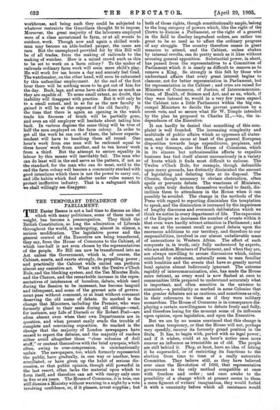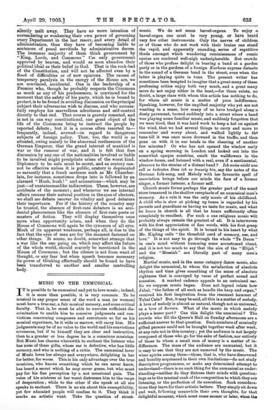THE TEMPORARY DECADENCE OF PARLIAMENT. T HE Easter Recess is not
a bad time to discuss an idea which with many politicians, some of them men of weight, has become a preoccupation. They think the British Constitution, so long the admiration of Liberals throughout the world, is undergoing, almost in silence, a serious modification. The legislative power and the general control of the, Executive are being transferred, they say, from the House of Commons to the Cabinet, of which one-half is not even chosen by the representatives of the people. No Bill can now be transformed into an Act unless the Government, which is, of course, the Cabinet, exerts, and exerts strongly, its propelling power ; and practically the Cabinet while united can perform almost any executive act. What with the Twelve o'Clock Rule, and the blocking system, and the Ten Minutes Rule, and the Closure, and the remarkable increase in the repre- sentatives of intolerance of boredom, debate, which used during the Session to be incessant, has become languid and infrequent, and some of the gravest acts of govern- ment pass without comment, or at least without comment deserving the old name of debate. So marked is the change that Ministers, including the Premier, who were formerly glued to their seats during all sittings—read, for instance, any Life of Disraeli or Sir Robert Peel—are often absent even when their own Departments are in question, and when present easily evade the trouble of complete and convincing exposition. So marked is the change that the majority of London newspapers have ceased to report the debates, and the majority of readers either avoid altogether those "close columns of dull stuff," or content themselves with the brief synopsis, which often, owing to over-compression, is unintentionally unfair. The newspapers, too, which formerly represented the public, have gradually, in one way or another, been conciliated, or have given up the habit of serious dis- cussion, so that public opinion, though still powerful in the last resort, often lacks the material upon which to form itself, and therefore can act with energy only once in five or six years. The House of Commons, it is true, can still dismiss a Ministry without warning in a night by a vote involving confidence, or, if it pleases, arrest supplies ; but both of those rights, though constitutionally ample, belong to the long category of powers which, like the right of the Crolvn to dismiss a Parliament, or the right of a general in the field to disobey imprudent orders, are rather too great to be so used as to affect the ordinary progress of any struggle. The country therefore ceases in great measure to attend, and the Cabinet, unless shaken by internal revolts, can do pretty much as it likes without arousing general opposition. Substantial power, in short, has passed from the representatives to a Committee of Parliament which it is nearly as difficult to remove as to remove a King. So strongly is this felt by those who understand affairs that every great interest begins to clamour, not for better representation in Parliament, but for representation in the Cabinet ; and cries are raised for Ministers of Commerce, of Justice, of Intercommunica- tions, of Health, of Science and Art, and so on, which, if they were listened to, would in a very few years expand the Cabinet into a little Parliament within the big one, compel Ministers to decide the gravest questions by a secret vote, and so secure what Sir W. Temple intended by the plan he proposed to Charles II.,—viz., the in- dependence of the Executive.
It can hardly be denied that something of this com- plaint is well founded. The increasing complexity and multitude of public affairs which so oppresses all states- men, and is one cause at least of the general European disposition towards large expenditures, perplexes, and in a way dismays, also the House of Commons, which in its sincere but unbusinesslike efforts to expedite business has tied itself almost unconsciously in a variety of knots which it finds most difficult to unloose. The Twelve o'Clock Rule, for example, though defensible upon many grounds, has distinctly diminished the amount of legislating and debating time at its disposal. The Closure, though necessary to obviate obstruction, often spoils or prevents debate. The weariness of Ministers, who quite truly declare themselves worked to death, dis- inclines them to attendance in the House when it can possibly be avoided. The change in the methods of the Press with regard to reporting diminishes the temptation to speak, and the diminution is increased by the impatience of lengthy discourse and overmuch deliberation which we think we notice in every department of life. The expansion of the Empire so increases the number of events within it that even wars hardly attract attention in Parliament; and we can at the moment recall no grand debate upon the enormous additions to our territory, and therefore to our responsibilities, involved in our almost unbelievable mass of annexations in Western Africa. The effect of such conquests is, in truth, only fully understood by experts, who are seldom Members of Parliament, and when they are, are always unwilling to arouse discussions which, unless conducted by statesmen, naturally seem to men familiar with localities and the events that have so greatly moved local opinion almost ludicrously ignorant. The extreme rapidity of intercommunication, also, has made the House more reticent, as every word is now flashed at once to communities little prepared to understand accurately what is important, and often sensitive in the extreme to comment,—a peculiarity so marked in some Colonies that the greater debaters are as cautious, and sometimes as oily, in their references to them as if they were military monarchies. The House of Commons is in consequence dis- playing a certain unwillingness to debate freely and fully, and therefore losing for the moment some of its influence upon opinion, upon legislation, and upon the Executive.
But we are by no means convinced that this change is more than temporary, or that the House will not, perhaps very speedily, recover its formerly grand position in the State. It has, to begin with, parted with no legal power; and if it wishes, could at an hour's notice once more recover an influence as irresistible as of old. The people are still behind it. Thy, at least, have no idea of letting it be superseded, or of restricting its functions to the election from time to time of a really autocratic Committee. They believe still, as they have believed ever since the Revolution of 1688, that representative government is the only method compatible at once with freedom and order ; and once awake to the possibility of a change which at present seems to them a mere figment of writers' imagination, they would forbid it with a unanimity before which all resistance would silently melt away. They have no more intention of surrendering or weakening their own power of governing every Department in the last resort, and every detail of administration, than they have of becoming liable to sentences of penal servitude by administrative decree. The immense majority of them think government by "King, Lords, and Commons" Cie only government approved by heaven, and would as soon abandon their political ideal as their belief in God. That is the rock-bed of the Constitution, and will not be affected even by a flood of difficulties or of new opinions. The causes of temporary paralysis in the energy of the House are, we are convinced, accidental. One is the leadership of a Premier who, though he probably respects the Commons as much as any of his predecessors, is convinced for the moment that the safety of his party, which he is bound to protect, is to be found in avoiding discussion on theprincipal subject their adversaries wish to discuss, and who success- fully employs his marvellous adroitness and self-control directly to that end. That course is gravely resented, and is not in one way constitutional, one great object of the life of the Commons being to instruct the people by reported debate ; but it is a course often resorted to— frequently, indeed, avowed—in regard to dangerous subjects of foreign policy. Then, too, the world is so situated, owing mainly to the abnormal restlessness of the German Emperor, that the grand interest of mankind is war or the rumour of war, and it is felt that free discussion by any one of the nationalities involved or liable to be involved might precipitate crises of the worst kind. Diplomacy to be safe must be secret, and as oratory can- not be effective unless it is public, oratory is deprecated so earnestly that a frank sentence such as Mr. Chamber- lain, for instance, sometimes drops into is followed by an alarmed "Hush, hush ! " and accusations—which may be just—of unstatesmanlike indiscretion. These, however, are accidents of the moment ; and whenever we see internal affairs resume their natural position in the eyes of electors, we shall see debate recover its vitality and good debaters their importance. For if the history of the country may be trusted, the absence of first-rate debaters is an acci- dental phenomenon like the absence of first-rate poets or masters of fiction. They will display themselves once more when opportunity arises, and when they do the House of Commons will again be the cynosure of all eyes. Much of its apparent weakness, perhaps all, is due to the fact that the eyes of men are for the moment fastened on other things. It seems, no doubt, somewhat strange that a war like the one going on, which may affect the future of the whole world, should scarcely be mentioned in the House of Commons ; but the silence is not from want of thought, or any fear lest when speech becomes necessary its power of thinking effectually should be found to have been transferred to another and smaller controlling body.



















































 Previous page
Previous page